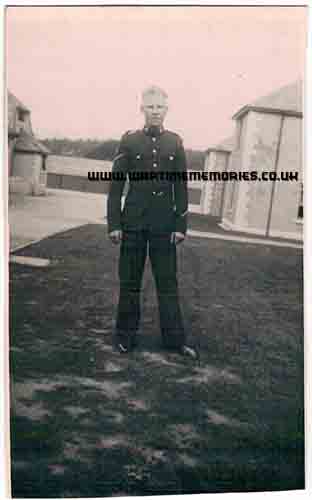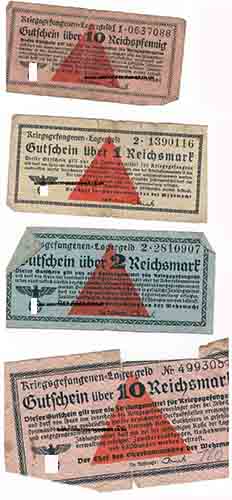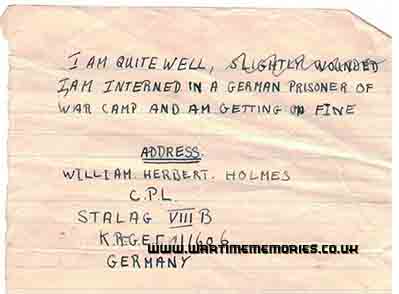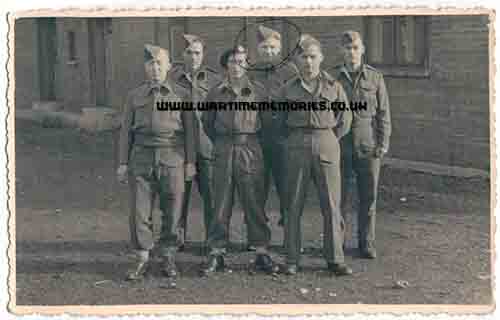Cpl. William Herbert Holmes
British Army 2nd Btn. Gloucestershire Regiment
from:Chalford, nr Stroud
My father, Bill Holmes, left school at 14 and became a grocer's assistant, delivering groceries on his pushbike. There weren't many job opportunities in rural Gloucestershire and he enlisted in the army in November 1933, applying to join the Tank Corps, no doubt dreaming of a glamorous life in Egypt. The army soon shattered these dreams and he was sent off to join the Second Battalion of the Gloucestershire Regiment, becoming army number 5182292.
Although he spent most of the years between 1933 and 1939 in the UK, he was posted to Egypt on 8 January 1936, returning to the UK on 2 January 1937. He seemed to really enjoy that posting, often talking about his time in the desert. Not as glamorous as the Tank Corps though.
During those years he also took Signalling Courses and gained educational certificates. Being in Signalling meant that he became a despatch rider with a motorbike, something that he really enjoyed but which later was to be his undoing. He was promoted to Lance Corporal (unpaid) on 1 November 1937 and Lance Corporal 9 April 1938, then Temporary Corporal 22 May 1939 and Corporal on 1 May 1939.
The 2nd Gloucesters were part of the British Expeditionary Force (BEF) and Bill arrived in France on 2 October 1939, shortly after the outbreak of war. In March 1940 he enjoyed 10 days leave in the UK and arrived back in France on 6 April 1940. Little did he know that he would not see the UK again for over 5 years.
On 8 May 1940 the Battalion was involved in the Battle of France after Germany's invasion of the Low Countries. It took part in the defensive screen protecting the Dunkirk evacuation.
Bill was reported as Prisoner of War on 20 May 1940 and reported as missing on 14 June 1940. The story he told was that he was captured because he got caught behind enemy lines carrying out his duties as a despatch driver. German records show him as being taken at Cassels on 20 May 1940 (4 days before his 25th birthday.
Its not clear exactly when he arrived at his camp, Stalag VIIIB (later named Stalag 344) but he was registered there on 14 June 1940. His prisoner number was 11606. Stalag VIIIB was one of the biggest camps. The camp was located near the small town of Lamsdorf (now called Lambinowice, in Poland) in what was then known as Upper Silesia. In 1943, the Lamsdorf camp was split up, and many of the prisoners (and Arbeitskommandos) were transferred to two new camps. The camps at Lamsdorf, VIIIB and VIIIF were re-numbered Stalag 344, where Bill remained.
Bills German Prisoner of War record shows that he was assigned to an Arbeitskommando (work camp) on 22 September 1942 and was released from this as surplus on 13 September 1943. The Arbeitkommando was E501 Ratibor which may have been a steelworks, an aircraft component factory, a coal mine or something else entirely records are sparse. The next entry in the Arbeitkommando log isn't clear, however Bill always told his family that he worked in the tailor's workshop and as far as I know never mentioned working in a steelworks or an aircraft component factory. However, he did learn German throughout his stay. There is also a family story that being in the tailor's shop helped him make clothes which allowed him to escape, but he was then recaptured.
Bill was particularly badly treated during at least part of his imprisonment, one of the guards taking exception to his Aryan appearance, deciding that he was in fact German and regularly subjecting him to beatings as a traitor
In January 1945, as the Soviet armies resumed their offensive and advanced into Germany, many prisoners from various camps were marched westward in groups of 200 to 300 in the so-called Long March or Death March in the final months of the Second World War in Europe. About 30,000 Allied PoWs were force-marched westward across Poland and Germany in appalling winter conditions, lasting about four months from January to April 1945.
Bill was one of the Allied POWs force-marched westward in early 1945 to avoid the Soviet armies - the so called Death March/Long March on this March. Many died en route and, indeed, he was extremely fortunate to survive, as he weighed about 84lb (38kilos) by the time he was repatriated, his weight on joining the Army in 1933 had been 130lbs.
As the POW columns reached the western side of Germany they ran into the advancing British and American armies. For Bill this brought liberation, apparently his first meeting with American soldiers coincided with him sitting in a ditch boiling some potatoes (where the potatoes, fuel or implements were liberated from was never told). He was not impressed by the Yanks apparently and carried on boiling his potatoes.
Before he was liberated Bill had been in a group of POWs walking towards a village around about the time many German forces were surrendering. The guards had by that time deserted them. At the entrance to the village was an American tank with soldiers in American uniforms. They indicated to the POWs to go into the village and as he was walking through the main street with the others it dawned on him that the American soldiers had said Come which an English speaker would never say but a German would have said Komm. He dived into a doorway and at that moment the tank opened fire, killing many of his fellow prisoners. The Americans had been German soldiers in American uniforms.
His British army records show him as being a returned POW on 26 May 1945 and that he was not to be sent overseas before 26 November 1945! He came home 2 days after his 30th birthday and 5 years 6 days after he was first captured.
Once home the former PoWs were found to be difficult, impossible to discipline, nothing the Army could threaten them with being regarded as being of any consequence. He was posted to Dundonald Combined Ops Camp near Troon in Ayrshire, Scotland on 5 July 1945. Bill didn't fancy going to the wilds of Scotland and refused. To force him to go his CO put his kit on the train and told him if he wanted to see it again he would have to go and get it. So he did go to get it and decided that he quite liked the place, being assigned to duties as a Barrack Room Corporal. It was there that he met my mother, who was serving in the ATS in the same camp.
He was given a class A release on 11th of November 1945 and posted to the Y list. Like many ex-POWs Bill found adjusting to civilian life very difficult, especially since he had enlisted in 1933 as an 18 year old. Bill had many dark moments throughout his life possibly suffering from undiagnosed post traumatic stress disorder. He was often in great mental distress. He also suffered from stomach and kidney problems. However, despite that he had a sharp sense of humour, was well regarded at work and enjoyed life when he could. He was a highly intelligent man who was never given help to overcome his wartime experiences or find educational opportunities.
The last six months of his life were probably the happiest, as he took medication for high blood pressure which seemed to have a side effect of alleviating his stress. In the last couple of years of his life he suffered from high blood pressure and he had at least one stroke which left him blind in one eye. He died on 18 January 1982 after suffering a thrombosis whilst walking home one afternoon. The weather that winter was particularly cold with a lot of snow and ice and it must have reminded him of his war-time experiences. He was walking along a country road and a car overtook him on his blind side. The car driver saw him drop to the ground just after passing him. He was pronounced dead on his arrival at the local hospital, he was 66.



